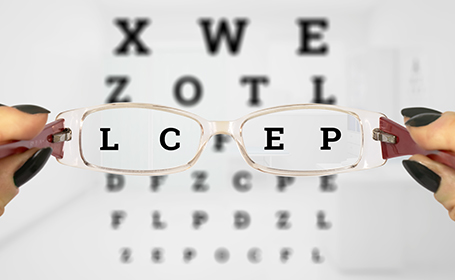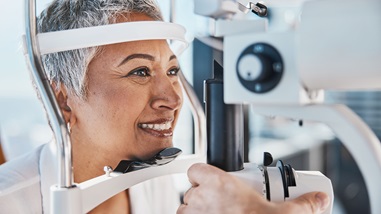
The importance of having regular eye checks
Attending regular eye checks can prevent the development of progressive eye conditions, such as cataracts and glaucoma. Mr Shahriar Nabili, consultant ophthalmic surgeon for Eye Care Scotland at Ross Hall Clinic Braehead, explains
Why is it important to attend your eye test?
An eye test not only helps you know whether you need glasses, or a change of prescription. It is also a vital health check for your eyes. An eye test can help identify common eye diseases such as glaucoma, which happens when your optic nerve (the nerve that connects your eye to your brain) becomes damaged, causing a build-up of fluid and pressure in your eye. Moreover, an eye test can help detect cataracts, which often impacts both eyes by causing cloudy patches to develop on the lens of your eye. If left untreated, these cloudy patches can expand, causing blurred vision.
Attending a regular eye test can help detect these problems at an earlier stage, helping you receive treatment as soon as possible. This can help preserve your eyesight, preventing your vision from deteriorating. In addition to these common eye diseases, an eye test can identify other health issues, including diabetes and high blood pressure.
Mr Shahriar Nabili, Consultant Ophthalmologist for Eye Care Scotland at Ross Hall Clinic Braehead in Glasgow says: "Having regular check-ups is really important for protecting the health of your eyes and vision. If you have any symptoms, such as a disturbance of vision, pain, weeping or redness in your eyes, you must go for an eye check as soon as possible. An Ophthalmologist can diagnose your problem and make sure any necessary treatment can be started quickly to avoid permanent damage to your eyesight."
How often should you get your eyes tested?
It is recommended that you attend an eye test with an eye specialist such as an Optometrist or Ophthalmologist every two years. But if you have diabetes or are over the age of 40 and have a family history of glaucoma, you will need to have your eyes tested more often.Mr Nabili highlights the importance of attending an eye test, adding: "As a Consultant Ophthalmologist, I have seen some truly devastating eye damage that could have been avoided if the patient had attended an eye check earlier. At Eye Care Scotland, we have a dedicated team of consultant ophthalmic surgeons, optometrists and ophthalmic nurses. We take eye health very seriously and care greatly about our patients’ satisfaction."
A visual field test can also monitor vision changes
If you have high blood pressure and diabetes, you might need to have a visual field test as well as a regular eye test.Diabetes and high blood pressure can increase your risk of experiencing blocked blood vessels in your optic nerve (the nerve that delivers visual information from your eye to your brain) and retina (a layer of nerve tissue at the back of your eye that enables you to see).
A visual field test might be performed to assess the impact of these health conditions on your vision. It will test your peripheral vision (the sides of your vision) by displaying a series of dim lights on the edges of your vision. Your eye specialist will provide you with a button that will be clicked every time you see one of these dim lights. This will identify any areas of vision loss in your visual field that could be caused by eye disease.
Having regular check-ups is really important for protecting the health of your eyes and vision. If you have any symptoms... you must go for an eye check as soon as possible.

What should you expect during an eye test?
During this test, you will be asked questions about your general health, any vision problems that you are experiencing, and any previous eye treatment you have received. Your eye test will be performed by an eye specialist such as an Optometrist or an Ophthalmologist (eye doctor), and will involve the following eye examinations:
- An eye check: This is to assess how your eyes work together;
- A visual acuity test: A visual acuity test examines your ability to identify an object's shape and form when looking straight ahead at a certain distance. Your eye specialist will carry out a visual acuity test for each eye
- A retinoscopy: During a retinoscopy, a handheld light is shone into your eyes to assess how your eye reacts to this light,
- An eye pressure test: Tonometry, also called an eye pressure test, uses a device known as tonometer to check the pressure inside your eye. Your eye specialist will first add anaesthetic (pain relief) drops into your eye and a dye will be used to temporarily stain your tears. A blue light is then shone into your eyes and a small, flat instrument will be used to flatten your cornea (the transparent, outer layer of your eyeball). This is a painless procedure and the extent that your cornea flattens is used to calculate the level of pressure in your eye.

4 tips from an eye specialist to help protect your eye health
As well as having regular eye checks, there are other ways in which you can help protect your eye health, according to Mr Nabili
- Feed your eyes from the inside out: Good eye health starts with healthy food. Nutrients like omega-3 fatty acids, lutein, zinc, and vitamins C and E could help ward off age-related vision problems like macular degeneration (an eye problem that affects the central part of your vision). Being a healthy weight also reduces the risk of diseases like type 2 diabetes.
- Stop smoking: Smoking puts you at higher risk of developing cataracts, optic nerve damage and macular degeneration.
- Protect your eyes from the sun: A good pair of sunglasses will help protect your eyes from damaging UV rays that increase the risk of cataracts and macular degeneration. Choose a pair that blocks 99% to 100% of UVA and UVB rays.
- Avoid binge drinking: Heavy alcohol consumption is associated with an increased risk of early age-related macular degeneration. Try to have several drink-free days each week and avoid binge drinking.
If you would like to book an eye consultation with one of our dedicated Optometrists or Ophthalmologists, please contact a member of our team by calling us or by booking an appointment online.
Tags
How do I book an appointment?
If you're concerned about symptoms you're experiencing or require further information on this subject, talk to a GP or see an expert consultant at your local Circle Hospital.